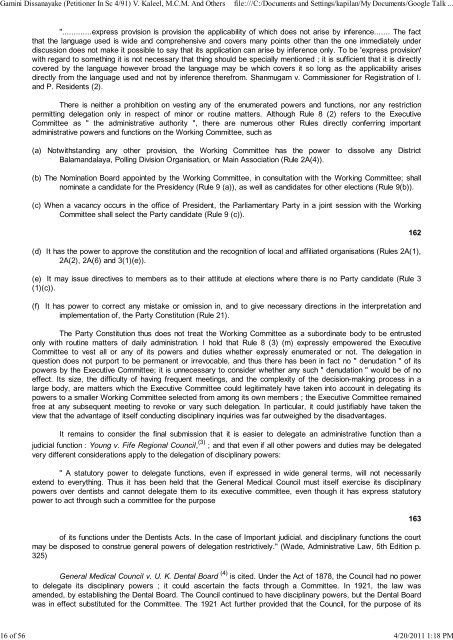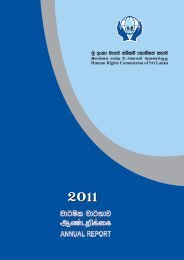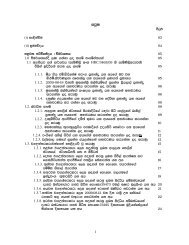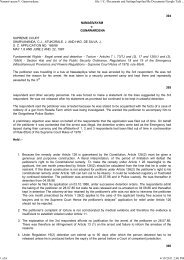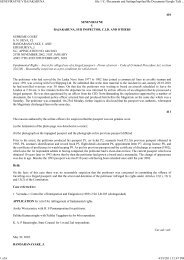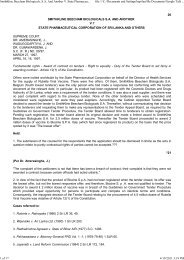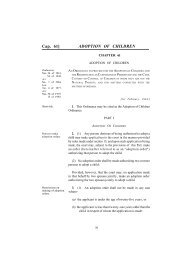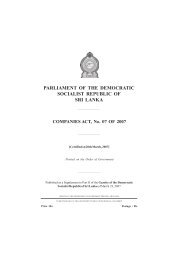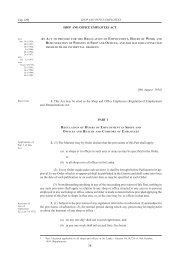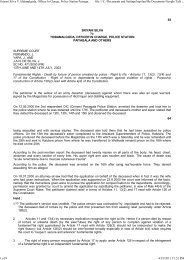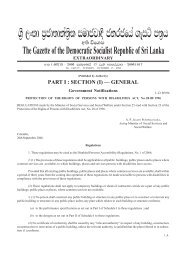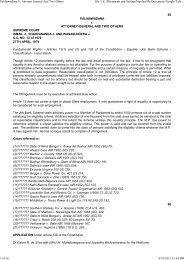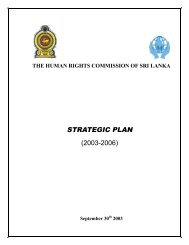Gamini Dissanayake (Petitio... - Human Rights Commission of Sri ...
Gamini Dissanayake (Petitio... - Human Rights Commission of Sri ...
Gamini Dissanayake (Petitio... - Human Rights Commission of Sri ...
Create successful ePaper yourself
Turn your PDF publications into a flip-book with our unique Google optimized e-Paper software.
<strong>Gamini</strong> <strong>Dissanayake</strong> (<strong>Petitio</strong>ner In Sc 4/91) V. Kaleel, M.C.M. And Others file:///C:/Documents and Settings/kapilan/My Documents/Google Talk ...<br />
".............express provision is provision the applicability <strong>of</strong> which does not arise by inference....... The fact<br />
that the language used is wide and comprehensive and covers many points other than the one immediately under<br />
discussion does not make it possible to say that its application can arise by inference only. To be 'express provision'<br />
with regard to something it is not necessary that thing should be specially mentioned ; it is sufficient that it is directly<br />
covered by the language however broad the language may be which covers it so long as the applicability arises<br />
directly from the language used and not by inference therefrom. Shanmugam v. <strong>Commission</strong>er for Registration <strong>of</strong> I.<br />
and P. Residents (2).<br />
There is neither a prohibition on vesting any <strong>of</strong> the enumerated powers and functions, nor any restriction<br />
permitting delegation only in respect <strong>of</strong> minor or routine matters. Although Rule 8 (2) refers to the Executive<br />
Committee as " the administrative authority ", there are numerous other Rules directly conferring important<br />
administrative powers and functions on the Working Committee, such as<br />
(a) Notwithstanding any other provision, the Working Committee has the power to dissolve any District<br />
Balamandalaya, Polling Division Organisation, or Main Association (Rule 2A(4)).<br />
(b) The Nomination Board appointed by the Working Committee, in consultation with the Working Committee; shall<br />
nominate a candidate for the Presidency (Rule 9 (a)), as well as candidates for other elections (Rule 9(b)).<br />
(c) When a vacancy occurs in the <strong>of</strong>fice <strong>of</strong> President, the Parliamentary Party in a joint session with the Working<br />
Committee shall select the Party candidate (Rule 9 (c)).<br />
(d) It has the power to approve the constitution and the recognition <strong>of</strong> local and affiliated organisations (Rules 2A(1),<br />
2A(2), 2A(6) and 3(1)(e)).<br />
(e) It may issue directives to members as to their attitude at elections where there is no Party candidate (Rule 3<br />
(1)(c)).<br />
(f) It has power to correct any mistake or omission in, and to give necessary directions in the interpretation and<br />
implementation <strong>of</strong>, the Party Constitution (Rule 21).<br />
The Party Constitution thus does not treat the Working Committee as a subordinate body to be entrusted<br />
only with routine matters <strong>of</strong> daily administration. I hold that Rule 8 (3) (m) expressly empowered the Executive<br />
Committee to vest all or any <strong>of</strong> its powers and duties whether expressly enumerated or not. The delegation in<br />
question does not purport to be permanent or irrevocable, and thus there has been in fact no " denudation " <strong>of</strong> its<br />
powers by the Executive Committee; it is unnecessary to consider whether any such " denudation " would be <strong>of</strong> no<br />
effect. Its size, the difficulty <strong>of</strong> having frequent meetings, and the complexity <strong>of</strong> the decision-making process in a<br />
large body, are matters which the Executive Committee could legitimately have taken into account in delegating its<br />
powers to a smaller Working Committee selected from among its own members ; the Executive Committee remained<br />
free at any subsequent meeting to revoke or vary such delegation. In particular, it could justifiably have taken the<br />
view that the advantage <strong>of</strong> itself conducting disciplinary inquiries was far outweighed by the disadvantages.<br />
It remains to consider the final submission that it is easier to delegate an administrative function than a<br />
judicial function : Young v. Fife Regional Council, (3) ; and that even if all other powers and duties may be delegated<br />
very different considerations apply to the delegation <strong>of</strong> disciplinary powers:<br />
" A statutory power to delegate functions, even if expressed in wide general terms, will not necessarily<br />
extend to everything. Thus it has been held that the General Medical Council must itself exercise its disciplinary<br />
powers over dentists and cannot delegate them to its executive committee, even though it has express statutory<br />
power to act through such a committee for the purpose<br />
<strong>of</strong> its functions under the Dentists Acts. In the case <strong>of</strong> Important judicial. and disciplinary functions the court<br />
may be disposed to construe general powers <strong>of</strong> delegation restrictively." (Wade, Administrative Law, 5th Edition p.<br />
325)<br />
General Medical Council v. U. K. Dental Board (4) is cited. Under the Act <strong>of</strong> 1878, the Council had no power<br />
to delegate its disciplinary powers ; it could ascertain the facts through a Committee. In 1921, the law was<br />
amended, by establishing the Dental Board. The Council continued to have disciplinary powers, but the Dental Board<br />
was in effect substituted for the Committee. The 1921 Act further provided that the Council, for the purpose <strong>of</strong> its<br />
16 <strong>of</strong> 56 4/20/2011 1:18 PM<br />
162<br />
163


